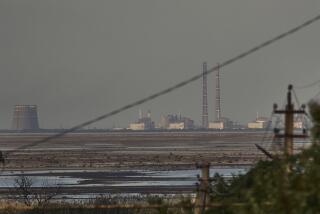N. Korea ousts U.N. nuclear inspectors
VIENNA — North Korea kicked out U.N. weapons inspectors from a plant that previously produced weapons-grade plutonium and notified the International Atomic Energy Agency that it would restart operations as early as next week, the nuclear watchdog said Wednesday.
The moves mean that North Korea could be reprocessing plutonium in a matter of months.
They also kill what little hope remained that the Bush administration could complete a denuclearization deal in the president’s remaining months in office. Although the government in Pyongyang has been warning for weeks that it would restart nuclear activities, the speed and extent of its moves have been discouraging to Washington.
For at least the time being, the three nuclear inspectors will remain at the sprawling Yongbyon nuclear compound, but they will not be allowed into the most important facility: the reprocessing plant that produces the deadly heart of the nuclear bomb.
At the insistence of the North Koreans, the inspectors removed seals and surveillance cameras that were installed last year to ensure that the plant was mothballed.
“This work was completed today. There are no more . . . seals and surveillance equipment at the reprocessing facility,” spokeswoman Melissa Fleming said in a statement at the IAEA’s headquarters in Vienna. She also said the North Koreans had notified the agency that they intended to “introduce nuclear material to the reprocessing plant in one week’s time.”
There was no immediate comment from Pyongyang, but officials there recently have made it clear that they are angry because the United States has not followed through on a promise to remove North Korea from its list of “terrorism-sponsoring” nations.
In Washington, the White House said the North Korean moves “are very disappointing and run counter to the expectations” of the five countries involved in talks with Pyongyang over its nuclear program. “These actions will only serve to further isolate North Korea,” said Gordon Johndroe, spokesman for the White House National Security Council.
Secretary of State Condoleezza Rice, meeting with foreign leaders at the United Nations, said the new developments did not indicate the end of the multinational talks with North Korea. “We’ve been through ups and downs in this process before,” she said.
President Bush announced in June that he would recommend the lifting of the terrorist-state designation as a reward for North Korea’s submission of a detailed inventory of its nuclear program. But the administration has not been satisfied with that report and is asking for additional verification before making the move.
“Now that the U.S. true colors are brought to light, [North Korea] neither wishes to be delisted as a ‘state sponsor of terrorism’ nor expects such a thing to happen,” an unnamed North Korean Foreign Ministry spokesman said in a state news agency report. “It will go its own way.”
North Korean rhetoric and brinkmanship are legendary, but the regime appears to be genuinely infuriated that the designation has not been lifted. It has not been implicated in terrorist activity since the 1980s, and the label makes it difficult to obtain international loans and investment.
“All their promises have been broken,” Lt. Col. Ri Gwang Hol, who gives tours to foreigners along the North Korean side of the demilitarized zone in Panmunjom, told American visitors today. He said that support within the military is weakening for denuclearization. “The soldiers don’t like negotiations that don’t produce any result.”
The day after Bush’s announcement that he would lift the terrorist designation, North Korea demolished the cooling tower of the nuclear reactor at Yongbyon as a gesture of goodwill. CNN and a State Department official were invited as observers.
The nuclear reactor remains closed, although the cooling tower -- essentially a concrete chimney -- could be quickly rebuilt.
But the more dangerous part of the nuclear compound is the reprocessing plant, which uses spent reactor fuel rods to produce the weapons-grade plutonium that goes into a warhead. North Korea already has an estimated 100 pounds, enough for as many as 10 bombs, and it tested a small device in 2006.
Leader Kim Jong Il has long seen nuclear capability as his impoverished and isolated nation’s only path toward respect.
--
Times staff writer Demick reported from Beijing and Pyongyang and special correspondent Damianova from Vienna. Times staff writer James Gerstenzang in Washington contributed to this report.
More to Read
Sign up for Essential California
The most important California stories and recommendations in your inbox every morning.
You may occasionally receive promotional content from the Los Angeles Times.










